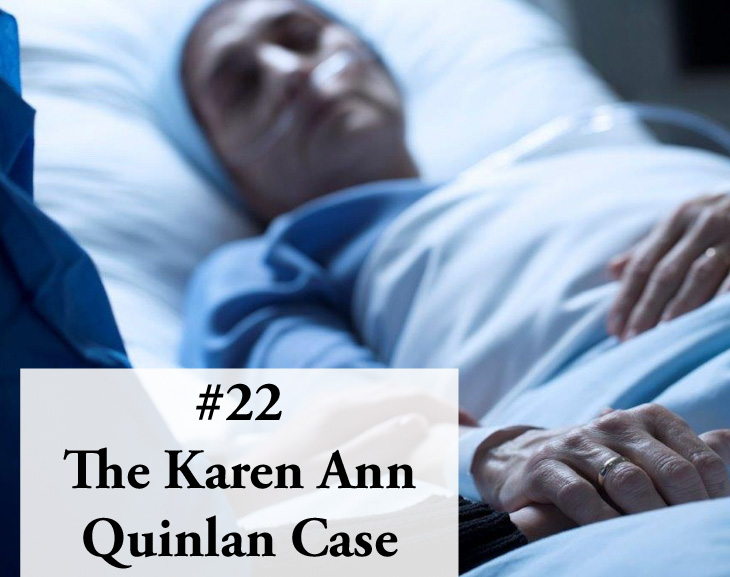#22 of Genova Burns’ Anniversary Countdown of the Most Influential Cases, Events and Laws in New Jersey
The Karen Ann Quinlan Case (2017)
September 17, 2019
Right to die regulation and legislation has long been part of our society’s discussions, and its legal implications have been extensively debated, challenged in the courts, and, in more recent months, become a regular part of conversation in the media. The “right to die” movement had its early beginnings here in New Jersey, with the Karen Ann Quinlan case.
In re Quinlan (70 NJ 10 (1976)) is the seminal case that established that a dying patient has the legal right to refuse treatment and, more significantly, that such right can be asserted on behalf of an incompetent patient by a third party. The case garnered national attention and provided the foundation, and the impetus, for “right to die” to spread nationally, ultimately resulting in the United States Supreme Court decision in Cruzan v. Director, Missouri Dept. of Health.
“Beginning with the case of Karen Ann Quinlan, New Jersey has been synonymous with efforts by the terminally ill to achieve the right to end their lives with dignity and on their terms,” said Judson M. Stein, Esq., Partner at Genova Burns. “With New Jersey’s early role in the ‘right to die’ movement and its contribution to national precedent, debate and conversation, the Karen Ann Quinlan case clearly established an initial legal standing for death with dignity. From early legislation to state and federal regulation regarding living wills and advance directives, to the growing number of states currently implementing their own regulation, this key decision still serves as a powerful legal precedent.”
Bringing things full circle, the New Jersey legislature approved the Medical Aid in Dying for the Terminally Ill Act on March 25, 2019, allowing for physician-assisted suicide for terminally-ill patients. This makes New Jersey the eighth state to allow terminally ill patients to legally end their lives.
CASE SUMMARY:
While at a party in 1975, 21-year-old Karen Ann Quinlan stopped breathing for two 15-minute intervals. First responders could not help her regain consciousness with the use of CPR, and she was taken to a hospital and placed on a respirator via a tracheotomy. After three days, her physician determined that she had suffered anoxia and experienced severe brain damage. She soon began to exhibit the characteristics of a persistent vegetative state. Consulting neurologists confirmed her condition and diagnosis, and attempts to wean her from the respirator were unsuccessful. She was considered to be respirator-dependent and nutrition was delivered by means of a naso-gastric tube.
At the time of the Quinlan case, ethical and legal issues surrounding the use of life-sustaining technology had not been resolved, and relief was sought through the courts. Quinlan’s family had come to terms with the limitations of technology in Ms. Quinlan's case, however, physicians and the healthcare institution insisted on pursuing a course to preserve her life despite her severely compromised condition and the wishes of her parents.
Quinlan's father, Joseph, sought the Court's appointment as her guardian, so that he could make the decision regarding the removal of her respirator. After a lower court refused to grant his petition, the New Jersey Supreme Court, reversed the lower court, and granted it. Joseph Quinlan was also supported by the traditions of the Roman Catholic Church, which hold that patients are not required to undergo treatments which are considered to be “extraordinary.” It was determined that Joseph Quinlan, acting as his daughter's surrogate, would be following her wishes and acting in her best interests.
The decision of the New Jersey Supreme Court turned on the issue of the right to privacy. This was the first time a Court was called upon to apply the right to privacy to a situation involving the removal of life support measures. The Court determined that this analysis applied to Ms. Quinlan and that, since she was incompetent, Mr. Quinlan could exercise her right to privacy on her behalf. Additionally, the Court expressed the opinion that the refusal of treatment in such cases should not be construed as suicide, nor that the withdrawal of treatment in such cases should be considered homicide. It also expressed the opinion that the resolution of future cases should lie with the family of the patient, in consultation with the physicians treating the patient and the Ethics Committee of the facility in which the patient is being treated.
Ruling
Following the Court’s ruling, Joseph Quinlan ordered that his daughter’s life support be removed. Amazingly, once the life support was removed, Karen Ann Quinlan would breathe unaided and live for another nine years, until her passing from a systemic infection and pneumonia in 1985.
Court proceedings surrounding the circumstances of Karen Ann Quinlan in New Jersey provided the first dramatic legal arena for examining the issues of patient self-determination and the termination of life-sustaining or life-extending technologies. The case made public the struggles which many physicians, institutions, and families had faced with the development of more sophisticated technologies which were able to prolong the process of dying for patients who would pass away more quickly from their illness and injuries if such technologies had not been employed.
The Quinlan case also provided the first milestone in a patient empowerment strategy that is the focal point of today’s hospice movement. For more than 40 years, the case has served as the basis for other lawsuits in New Jersey and elsewhere, resulting in numerous legislative enactments, Advanced Directives, and Practitioner Orders for Life-Sustaining Treatment (POLST), and even consideration of physician-assisted suicide.
Tags: Genova Burns LLC • Right to die • 30th Anniversary • Judson M. Stein • New Jersey • New Jersey Supreme Court

